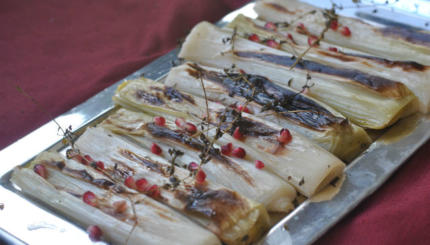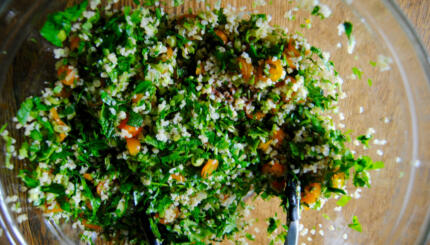People become vegans for all sorts of reasons–ethical, environmental, health. But recently, a growing number of Jews have begun adopting a vegan diet as an expression of their Judaism, or at least a piece of it.
Veganism entails abstaining from any product derived from an animal–meat, eggs, dairy, leather, and even, for some, honey. The idea of not consuming these products has been around for a while, but it was only given the term “vegan” in the 1940s to differentiate practitioners from vegetarians. Vegan diets have many of health benefits, especially because vegans tend to eat more whole grains, legumes, and produce, but there are some important health considerations to think about.
Jews and vegans have been sharing headlines for some time now. Rav Kook famously promoted Jewish vegetarianism at the turn of the 20th century. Novelist Jonathan Safran Foer took a break from fiction to write about how he came to his decision to be a vegan in Eating Animals (after that, he changed it up again and edited a haggadah). Now the idea of Kosher veganism has come even more directly into the spotlight with the creation of The Shamayim V’Aaretz Institute, which seeks to educate and create leadership around animal welfare activism, Kosher veganism, and Jewish spirituality. Sporting an all-star cast, the Institute was founded by Rabbi Shmuly Yanklowitz of Uri L’Tzedek and Mayim Bialik. Its board includes noted performer Matisyahu, who recently had a makeover.
Mayim Bialik, everyone’s new favorite Jewish celebrity, has become a vocal advocate of the vegan lifestyle and attachment parenting. Jumping on the s*** people say train, she starred in a video for the Institute called “Stuff Kosher Meat Eaters Say to Kosher Vegans.”
The Nosher celebrates the traditions and recipes that have brought Jews together for centuries. Donate today to keep The Nosher's stories and recipes accessible to all.
But while the number of supporters for and interest in this lifestyle is growing (check out the 34,000+ views of Mayim’s video), there are still plenty of people who feel Judaism and veganism are irreconcilable belief systems. Sorting through the spam in the comments, there are a few dissident voices. “The fact is that the Halacha DOES require the eating of meat… as with any other Halacha – we have to do things we don’t want to do.” Another commenter wrote, “This is absurd. Torah is inherently incompatible with veganism.” Rav Shmuly has a few answers for these allegations.
If you are a vegan or want to learn more about the concept of Kosher veganism, I recommend checking out the Shamayim V’Aretz Institute’s web site for recipes, resources for vegan clothes and cosmetics, and great videos–like Rav Shmuly and his wife showing off their vegan groceries. The Beet Eating Heeb is also full of resources and commentaries on veganism, Judaism, and the relationship between the two.


